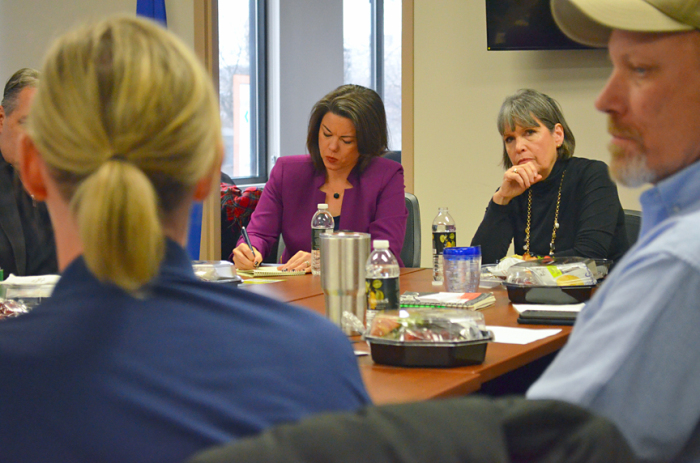

Share
Eventually, the federal government shutdown will reach a tipping point, federal employees told U.S. Reps. Angie Craig and Betty McCollum in a roundtable discussion arranged by their unions at the St. Paul Labor Center Friday.
What that tipping point ends up being is a question keeping many around the table awake at night.
“I’m very afraid,” Erin Phelps, an air traffic controller at Minneapolis St. Paul airport told the DFL congresswomen. “Our systems are being degraded by this shutdown, and it’s scary.”
Air traffic controllers, members of NATCA, are being forced to work without pay during the shutdown, as are TSA agents and officers at federal prisons in Minnesota, members of the American Federation of Government Employees. They missed their first paychecks last Friday, and it appears likely they will miss another next week.
That means workers like Phelps, whose husband is an air traffic controller too, are dipping into their savings to pay for day care, gas, housing, health care co-pays and other costs – or taking out short-term loans.
The mounting stress and plummeting morale are making their workplaces less safe, workers warned, both for themselves and the public they serve. “I’m becoming more convinced someone is going to die in our prisons,” said one corrections officer, who drove from Rochester to attend the meeting.
McCollum, a DFLer who represents Minnesota’s 4th Congressional District, blasted President Donald Trump and Senate Republicans for dragging out the shutdown to gain leverage in their efforts to build a wall along the U.S. border with Mexico.
“We all took the same oath of office to protect and defend the United States,” McCollum said. “This is not protecting and defending… This is putting politics over country.”

Craig, a DFLer newly elected to the state’s 2nd Congressional District, noted the twisted irony that Republicans’ crusade to make the nation more safe with a wall is, according to workers in our airports and prisons, having the opposite effect.
“It makes no sense to me,” Craig told workers in the meeting, hosted by the St. Paul Regional Labor Federation. “Every Democrat I talk to is up for a conversation about border security, but we cannot keep holding federal workers hostage.”
Craig and McCollum want Senate Majority Leader Mitch McConnell to call a vote on budget bills negotiated in December, when Republicans controlled both chambers of Congress. “It’s certainly not the budget I would have wanted, but I’m willing to support it” to end the shutdown, McCollum said.
A veto-proof majority of senators supported the budget, too – until McConnell pulled the bill in deference to Trump’s last-minute demand for $5 billion in wall funding.
Craig recalled her first vote as a member of Congress for “exactly the same bill the Senate passed three weeks before I got there.” She added: “The Senate needs to take up its bill again and end this.”
Furloughed workers from other government agencies, including the IRS, HUD and the FDA, also attended the meeting. They offered McCollum and Craig a litany of examples of how the shutdown is impacting Americans, from blocked access to tax forms needed to fill out financial aid documents to government-backed housing loans caught in limbo.
Workers also described mounting economic pressures as the shutdown drags on. “I’m stuck between a rock and a hard place,” one HUD employee said. “My lease is coming due, and I can’t sign a new lease because I don’t have any income. It’s appalling. It feels like we’ve been made invisible.”
To make matters worse, federal employees are barred from accepting certain gifts, making it difficult for labor organizations and other agencies to funnel support directly to them during this time of hardship.
St. Paul RLF President Bobby Kasper said the federation’s nonprofit arm, which provides emergency assistance to union members during strikes, lockouts or other financial crises, is seeking legal advice about how to make sure the labor community can provide assistance in solidarity with federal workers for as long as the shutdown lasts.
“The people impacted most by this shutdown didn’t go into public service to get rich, and they don’t deserve to be treated like a political football,” Kasper said. “The labor community is going to stand with our brothers and sisters in AFGE and other federal unions, and it’s reassuring to know we have friends in Congress who will do the same.”

